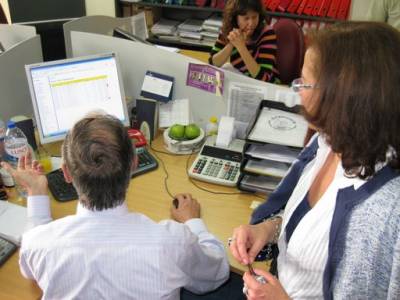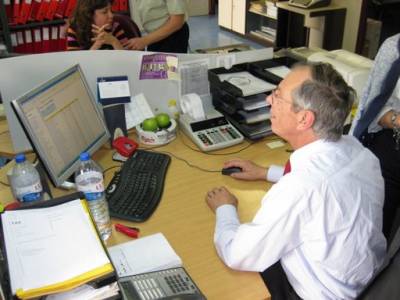Why are ship suppliers experts in veterinary controls?
A blog entry by Quality Control Manager and Veterinary Law Expert Steeve Eldred
Steeve Eldred, Member of the Subgroup on veterinary affairs of the CEVVT Working Group, explains why ship suppliers are food safety specialists by design – and why a trusting relationship with official veterinarians is crucial to ship supply success.
Introduction
When the crew of a commercial vessel or passengers of a big cruise liner dig into their juicy Argentine steak, or they enjoy authentic Japanese sushi or delicious peanuts from India, they eat with the assurance that the food they eat is safe to consume – even though it must have travelled far distances over long periods to be made available on board of the vessel. Ship suppliers dealing in food products make this happen – every day, all the time.
Food Safety – it's in our DNA
So, you will not be surprised that ship suppliers know all about the importance of maintaining high standards when it comes to food safety. We make sure that even after food products have been moved over long distances and exposed to various modes of transportation and storage, they still always comply with all the stringent EU rules that ensure the food is safe to eat! And yummy, too.
Successful ship supply of food depends on meeting international and EU food safety standards
But this does not happen just like that! Ship suppliers, importers, exporters, logistics operators and veterinary officers work together every day to ensure compliance with health and safety regulations. All actors involved in ship supply know: Importing food products that meet international and EU food safety standards is crucial to protecting human and animal health and consumers' confidence in the food system.
The essential role of the official veterinary officers is to protect the EU market
But we ship suppliers cannot do it alone! Veterinary officers of the EU Member States are responsible for ensuring the food safety of the "products of animal origin" (POAO) or the "high-risk food of non-animal origin" (HRFNAO) that we import. As such, veterinary officers are responsible for inspecting and approving the health and safety of animal products entering the EU. Therefore, veterinary officers play an essential role in the import process, from the moment they receive a notification of an arriving shipment to the document verification and the physical inspection of a shipment until they sign off at the end of its journey through the supply chain.
Official Food Controls
These officials in each EU Member State are responsible for conducting official controls to ensure that businesses meet the standards established by the Official Controls Regulation (EU) 2017/625. This law addresses official controls and other official activities to ensure the application of food and feed law, animal health and welfare rules, and plant health and protection products. It applies to ship suppliers, too. We know it as Official Controls Regulation - OCR). Some of the areas it deals with that are relevant for ship suppliers:
· Risk-Based Approach
· Official Controls on the Operator's Processes and Activities
· Transparency of Official Controls
· Operators' Obligations
· Official Laboratories
· Sampling, Analysis, Tests and Diagnosis
· Border Controls
· Official Certification
· Enforcement Measures
· Penalties
· Sector-specific control rules
Veterinary controls for ship supplies change constantly – are you up to date?
It's common knowledge that providing ships might be complex due to the amount of red tape and hoops we have to jump to – even before considering veterinary legislation. But the legislation really heats up when it comes to selling food to ships at sea must have familiarity with EU veterinary processes and a solid grasp of relevant background information. In addition, specific rules for importing, exporting, and transiting veterinary-controlled goods exist at the federal level. As the laws mentioned earlier are regularly being updated and improved, it is crucial to stay current with them at all times to operate according to the most recent regulations. This is where trade associations, like OCEAN, make such a difference, as they keep up always informed and encourage discussion with the legislator for better food safety legislation.
Importing food goods into the EU
EU laws stipulate that veterinary certificates issued by countries outside the EU must be written in line with EU standards. Inconsistencies in veterinarian certifications might lead to costly rework or even product rejection. In addition, items requiring veterinary supervision must be registered with and submitted to the EU's veterinary and import office to pass customs and veterinary checks for import into the European Union. A bonded warehouse is the norm for storing food and non-food ship supplies in our industry.
Do you forget transit?
Regarding Official Controls, import processes tend to get much attention. However, regarding ship supplies, I would like you to remember that we often supply our goods in a special customs procedure called "Transit". You know this from your own travels – sometimes you are "in transit" through another country when changing aeroplanes. You are physically in the country's airport but not officially in the country (aka, you have not passed immigration and customs). In brief, customs transit is a way to move goods from one place to another:
· between two points in the same customs territory that go through another customs territory, or
· between two or more different customs territories.
Using the Customs Transit procedure, ship suppliers can put import duties, taxes, and commercial policy measures on hold. In this way, the paperwork for clearing customs happens at the point of destination instead of at the point of entry into customs territory. So, practically speaking, if you start a transit movement in Hamburg, you can take it to the port of Southampton in the UK without complex import or export procedures when your truck enters the UK through Dover, for example.
No risk through transit
Crucially, however, trucks with food are sealed when they leave Hamburg and only reopened for immediate delivery onboard a vessel. When in transit, goods cannot enter the internal market of a country – they, therefore, pose low to no risk to citizens, animals, and plants. Instead, they are delivered directly to the vessel in a sealed truck. This unique was to supply needs to be recognized, and simplifications offered. For example, are burdensome manual pre-notifications really necessary? Can authorities rely on commercial records instead to exercise control? Is a full Export / Veterinary Health Certificate needed (often unavailable)? Can ship suppliers work within trusted trader systems where we demonstrate how reliable we are? Let's leverage the opportunities that modern technology offers us
We are your partners.
Thanks to veterinary officers, importers and ship lines can ensure that the food they import meets international safety standards. This is crucial to protecting human and animal health and consumers' confidence in the food system. This is why we always stress that ship supplies can only be successful with teamwork. This is extended teamwork, where companies work closely with authorities, where official veterinarians can rely on food safety efforts and international quality certification of the ship suppliers. We are partners on the mission to make available a wide range of different tastes and food experiences to a growing EU and international consumer base – safe and healthy to enjoy.
Will you join us on this journey? We welcome you.




